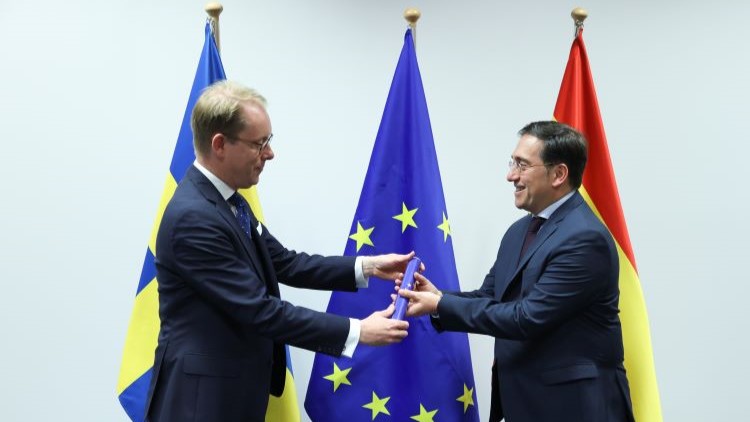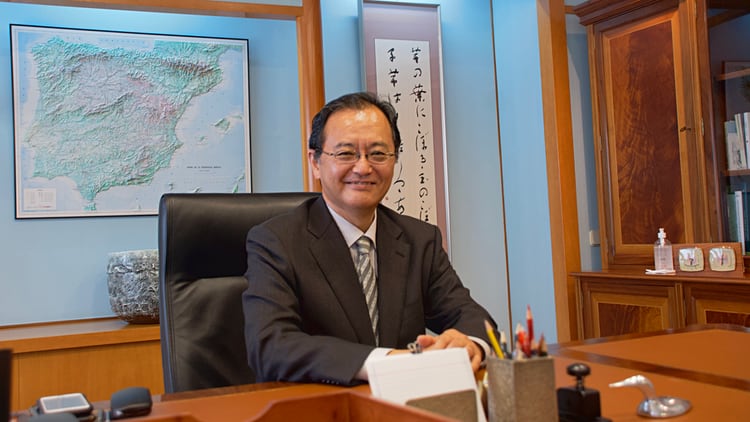Eduardo González
Foreign Minister José Manuel Albares warned yesterday that the rebellion led by Russian paramilitaries of the Wagner Group near Moscow reveals that “what seemed to be a Russian internal monolithic solidity has shown that it has very deep gaps”.
Albares participated yesterday in Luxembourg in the last Foreign Affairs Council (FAC) of the Swedish Presidency of the EU Council and, therefore, “five days before Spain assumes the EU Presidency.” “In fact, Sweden has already passed the baton to us,” he announced during the press conference following the Council. “We have had a ceremony, taking advantage of a moment of rest, in which we have physically been handed the baton with the European flag,” he added.
During the Luxembourg meeting, European ministers discussed “in depth” the events of this past weekend in Russia, after Yevgeni Prigozhin’s paramilitaries seized the Russian city of Rostov, headquarters of the Russian military command for the south, and advanced several hundred kilometers towards the Russian capital.
“In the face of the Russian division, the unity of Europe stands out, and that is something that the Spanish Presidency of the EU is going to strive mainly to maintain that unity,” Albares said. “In these complex and turbulent times, Europe must maintain the same path we have had so far and keep us united, and the efforts of Spain and the Government of Spain will be aimed at that,” he added.
“What has happened in Russia this weekend is worrying, which highlights an internal weakness that still raises, moreover, unknowns,” the minister continued. However, he warned, this is “an internal Russian affair and, therefore, it is due to internal Russian dynamics.” “We must be cautious, that is one of the things on which we have all agreed, because of the suddenness of the events, because of the speed with which events of one sign or another were happening,” he continued. In any case, he said, “what is evident is that what seemed to be a monolithic internal Russian solidity, has shown that it has gaps, and gaps that are very deep, and that perhaps, and we will know this with the close analysis that we are going to make together, have more depth than just the events that occurred yesterday”.
“Of course, that Russia, which is a nuclear power, is subject to these kinds of internal divisions, is something that we are going to continue to analyze and follow very closely always united with our European partners and our NATO allies,” he said. Therefore, “at this time, coordination with our European partners and NATO allies is more important than ever and, in any case, it should not distract us either from what has been our goal since the beginning of the aggression against Ukraine: that peace returns to Ukraine and Europe as soon as possible,” he added.
During yesterday’s meeting, the Ukrainian Minister of Foreign Affairs, Dmytro Kuleba, intervened by videoconference and made “his analysis of the situation in Ukraine at the moment” and of “the progress they are making in the counteroffensive,” Albares explained. “I have been able to express Spain’s unconditional support, in all aspects, to Ukraine, as long as necessary,” he added. Likewise, the eleventh package of sanctions against Russia, “which is focused on circumvention”, was also addressed in Luxembourg, and an agreement was reached “to increase the ceiling of the European peace fund to 3.5 billion euros, money that is going to allow us to finance the sending of more aid to Ukraine and boost the European defense industry,” the minister explained.
EU-CELAC
The Luxembourg FAC was held a few weeks before the EU-Community of Latin American and Caribbean States (CELAC) Summit, which will take place on July 17 and 18 in Brussels, already within the framework of the Spanish Presidency. “All my European counterparts, without exception, have agreed on the enormous importance of this meeting at the highest level, and most of them have expressed that they will be represented by their Head of State or Government,” said Albares.
“I have proposed that these high-level meetings be held regularly and I have indicated that we cannot miss this opportunity to strengthen the bi-regional political agenda, especially in this context in which Europe needs more than ever to be close to its friends and allies in the world,” he continued.







